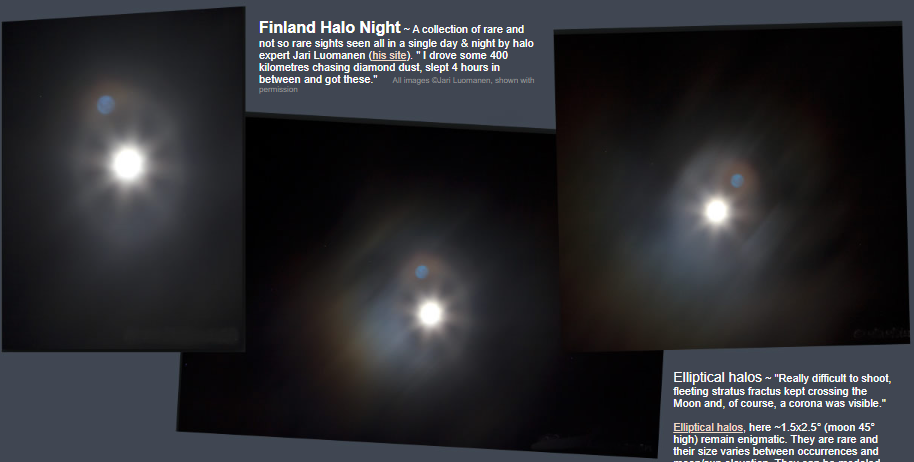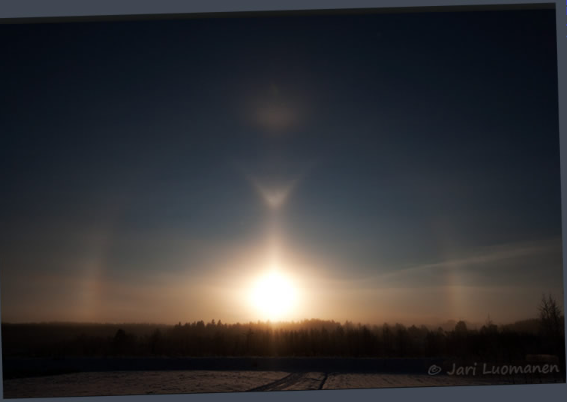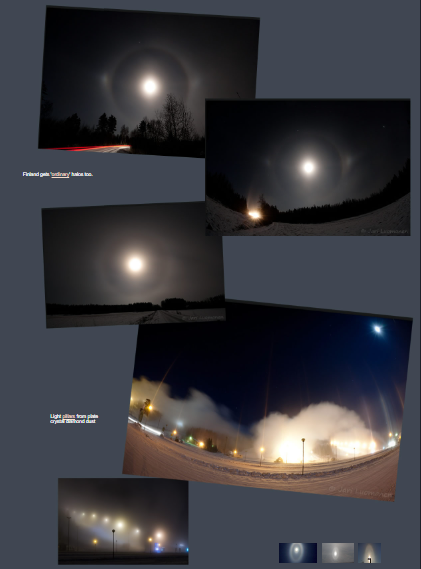OPOD - Rare Halo Night, Finland
OPOD - Rare Halo Night, Finland: A Dazzling Display of Atmospheric Optics
Finland is known for its stunning natural beauty, and on a rare halo night, the skies above this Nordic country put on a breathtaking show. Halo expert Jari Luomanen embarked on an adventure, driving approximately 400 kilometers to capture a collection of rare and not-so-rare sights that unfolded over the course of a single day and night. Armed with his camera, Jari documented these mesmerizing atmospheric optics phenomena, showcasing the wonders of the Finnish sky.
Elliptical Halos: An Enigmatic Sight
Among the captivating images captured by Jari Luomanen are elliptical halos, an elusive and puzzling phenomenon. These halos, measuring approximately 1.5x2.5° in size, appeared as fleeting stratus fractus clouds crossed the moon. The presence of a corona added to the ethereal beauty of these halos. Despite their rarity, attempts have been made to understand the mechanism behind their formation.
The size of elliptical halos varies with different occurrences and the elevation of the moon or sun. Several theories have been proposed to explain their existence, but none have provided a crystallographically realistic explanation. One possibility is that these halos can be modeled by invoking very flat pyramidal crystals, although they are not entirely accurate. Alternatively, larger cluster or sterically hindered/strained dendritic crystals could also play a role in their formation. It is worth noting that the six-pointed star visible in one of the images is actually an artifact caused by the camera's aperture blades.
The Mystifying Moilanen Arc
Another enigmatic atmospheric optics phenomenon captured by Jari Luomanen is the Moilanen Arc. This arc, displayed magnificently above the sun and inside the 22° halo, takes on a distinctive "V" shape. To create this stunning arc, rays of light must pass through two ice prism faces that are inclined at an angle of 34° to each other. However, this configuration is crystallographically unrealistic, leaving scientists puzzled about its true nature. One possibility is that crystal twinning may be responsible for the formation of the Moilanen Arc, but further evidence is needed to confirm this hypothesis.
Ordinary Halos: Beauty in Simplicity
While the rare and enigmatic atmospheric optics phenomena steal the spotlight, Finland also experiences its fair share of "ordinary" halos. These halos, more commonly observed, add a touch of beauty and wonder to the sky. They can appear as luminous circles or arcs around the sun or moon, caused by the refraction and reflection of light by ice crystals in the atmosphere. These halos often display a range of colors, including vibrant reds and blues, creating a magical ambiance.
Light Pillars: A Dazzling Display of Diamond Dust
In Finland, the phenomenon known as light pillars can be observed under specific weather conditions. Light pillars are vertical columns of light that extend above or below a light source, such as streetlights or the moon. These pillars are created when light interacts with flat, plate-like ice crystals in the atmosphere. When the crystals align horizontally, they reflect the light, creating a mesmerizing pillar-like effect. On a halo night in Finland, Jari Luomanen captured the enchanting beauty of light pillars formed by diamond dust, adding another dimension to the already captivating atmospheric optics display.
Conclusion
The rare halo night in Finland showcased a mesmerizing array of atmospheric optics phenomena, capturing the imagination of all who witnessed its beauty. From the elusive elliptical halos to the mystifying Moilanen Arc and the enchanting light pillars, these natural wonders serve as a reminder of the intricate and awe-inspiring phenomena that occur in the skies above us. While many questions remain unanswered, the photographs taken by Jari Luomanen provide a glimpse into the ethereal world of atmospheric optics and inspire further exploration and understanding of these captivating natural phenomena.
Finland Halo Night ~ A collection of rare and not so rare sights seen all in a single day & night by halo expert Jari Luomanen (his site). " I drove some 400 kilometres chasing diamond dust, slept 4 hours in between and got these." All images ©Jari Luomanen, shown with permission

Elliptical halos ~ "Really difficult to shoot, fleeting stratus fractus kept crossing the Moon and, of course, a corona was visible."
Elliptical halos, here ~1.5x2.5° (moon 45° high) remain enigmatic. They are rare and their size varies between occurrences and moon/sun elevation. They can be modeled - but not very well - by invoking very flat pyramidal crystals but these are not crystallographically realistic. Larger cluster or sterically hindered/strained dendritic crystals are other possibilities. The 6-pointed star is a camera aperture blade artifact, the lens had to be considerably stopped down.


Moilanen Arc ~ Captured late afternoon and deliberately underexposed to darken the very bright sky. The "V" shaped Moilanen arc above the sun and inside the 22° halo is magnificently displayed here.
Another enigma. The arc requires rays to pass through two ice prism faces inclined 34° to each other. That is also crystallographically unrealistic. Some kind of crystal twinning could be responsible but we have no evidence.

Finland gets 'ordinary' halos too.
Light pillars from plate crystal diamond dust
Note: this article has been automatically converted from the old site and may not appear as intended. You can find the original article here.
Reference Atmospheric Optics
If you use any of the definitions, information, or data presented on Atmospheric Optics, please copy the link or reference below to properly credit us as the reference source. Thank you!
-
<a href="https://atoptics.co.uk/blog/opod-rare-halo-night-finland/">OPOD - Rare Halo Night, Finland</a>
-
"OPOD - Rare Halo Night, Finland". Atmospheric Optics. Accessed on November 21, 2024. https://atoptics.co.uk/blog/opod-rare-halo-night-finland/.
-
"OPOD - Rare Halo Night, Finland". Atmospheric Optics, https://atoptics.co.uk/blog/opod-rare-halo-night-finland/. Accessed 21 November, 2024
-
OPOD - Rare Halo Night, Finland. Atmospheric Optics. Retrieved from https://atoptics.co.uk/blog/opod-rare-halo-night-finland/.